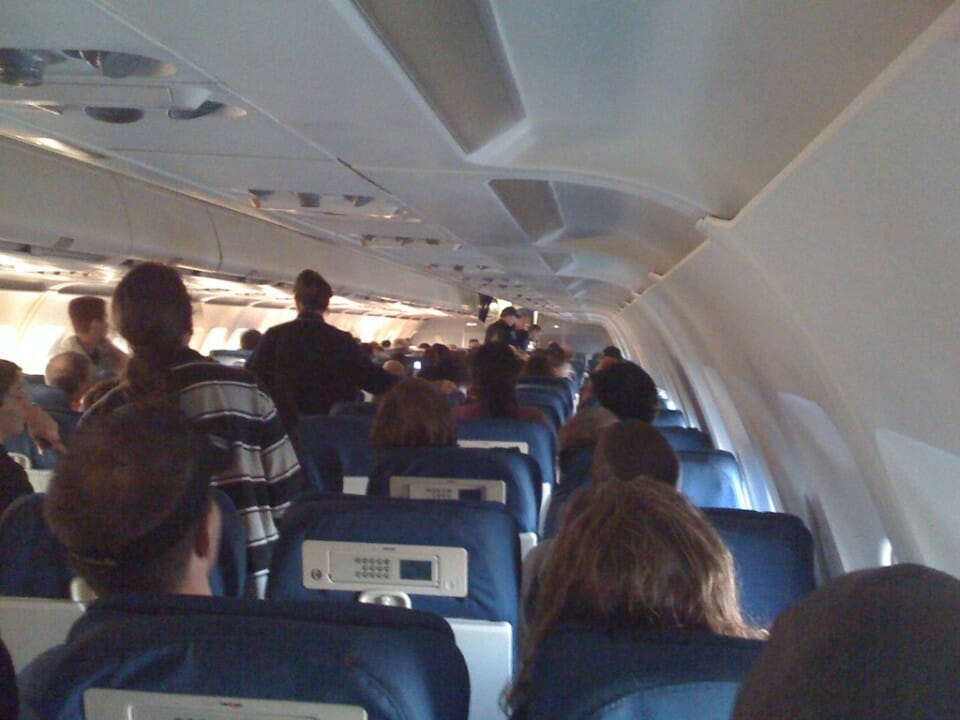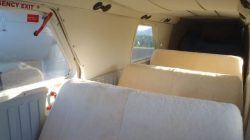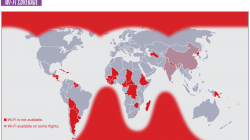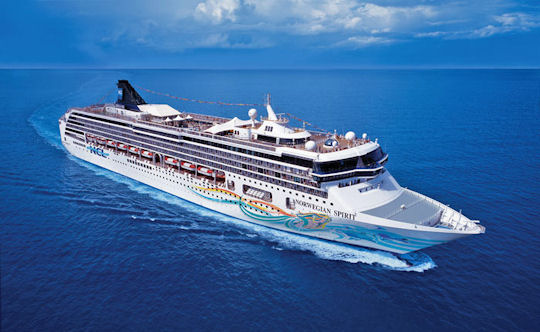What happened to flying the friendly skies? Bad behavior aboard flights has gone from a rare occurrence to everyday news. Welcome to the wild, wild, west. In addition to passengers and flight crews getting injured, these incidents are real threats to airliner safety, learn about legal implications of this sort of accidents by checking with a law office or expert like someone at this TBI lawyer Las Vegas firm. In my post on Tuesday, I talked about the extension of the mask mandate and the chaos associated with the mandate. If you missed that post, you can read it here.
The Federal Aviation Administration (FAA) Position
The following verbiage is ver Batum from the FAA press release yesterday. I wanted to ensure that the context of their message is clear.
The U.S. Department of Transportation’s Federal Aviation Administration (FAA) has proposed another $531,545 in civil penalties against 34 airline passengers for alleged unruly behavior, bringing the total for 2021 to more than $1 million. Since Jan. 1, 2021, the FAA has received approximately 3,889 reports of unruly behavior by passengers, including about 2,867 reports of passengers refusing to comply with the federal facemask mandate.
Today’s fines are part of the agency’s Zero Tolerance campaign against unruly passenger behavior. Earlier in August, the FAA sent a letter (PDF) to airports requesting they coordinate more closely with local law enforcement to prosecute egregious cases. The FAA does not have criminal prosecutorial authority. The letter also requested that airports work to prevent passengers from bringing “to-go” cups of alcohol aboard the aircraft.
The FAA launched a public awareness campaign to engage with airline passengers, flight attendants, pilots and travelers on this issue. Campaign items to discourage unruly behavior include the FAA Kids Talk PSA and other content across its social media platforms.
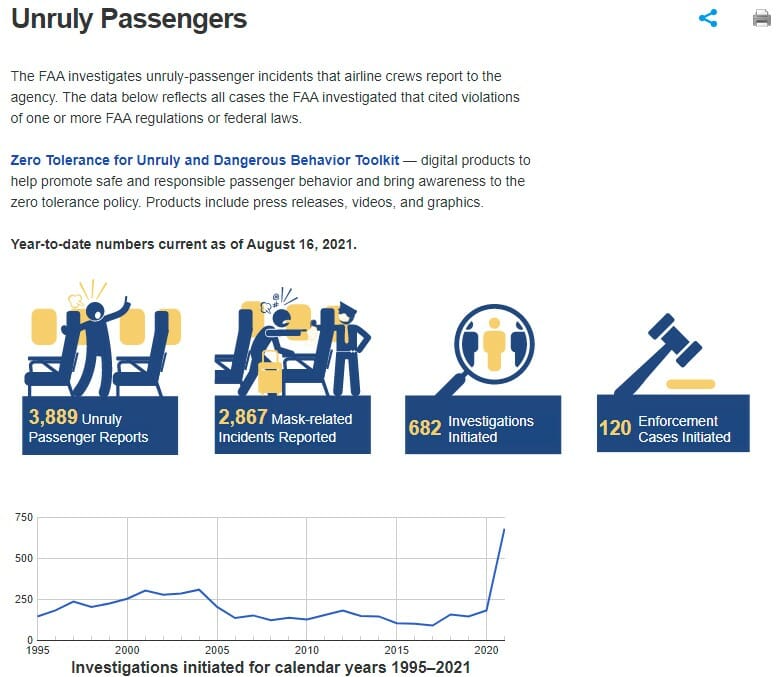
New Members Of The $30,000 Club
The acts of unruly passenger behavior have gotten serious and so have the fines for serious offenders. Here are the biggest offenders and what they did to get a fine of $30,000 or more:
- $45,000 against a passenger on a May 24, 2021, jetBlue Airways flight from New York, N.Y., to Orlando, Fla., for allegedly throwing objects, including his carry-on luggage, at other passengers; refusing to stay seated; lying on the floor in the aisle, refusing to get up, and then grabbing a flight attendant by the ankles and putting his head up her skirt. The passenger was placed in flexi-cuffs and the flight made an emergency landing in Richmond, Va.
- $42,000 against a passenger on a May 16, 2021, jetBlue Airways flight from Queens, N.Y., to San Francisco, Calif., for allegedly interfering with crewmembers after failing to comply with the facemask mandate; making non-consensual physical contact with another passenger; throwing a playing card at a passenger and threatening him with physical harm; making stabbing gestures towards certain passengers; and snorting what appeared to be cocaine from a plastic bag, which the cabin crew confiscated. The passenger became increasingly agitated and the crew equipped themselves with flex cuffs and ice mallets to ensure the safety of the flight if his behavior worsened. The flight diverted to Minneapolis, Minn., where law enforcement removed the passenger from the aircraft.
- $32,500 against a passenger on a Jan. 2, 2021, Southwest Airlines flight from Orlando, Fla., to Kansas City, Mo., for allegedly assaulting passengers around him because someone in his row would not change seats to accommodate his travel partner. He told his travel partner he would need to bail him out of jail for the physically violent crimes he threatened to commit. The captain returned the flight to the gate where law enforcement met the passenger. Southwest banned him from flying with the carrier in the future. The FAA does not put passengers on no-fly lists.
- $30,000 against a passenger on a Jan. 3, 2021, Frontier Airlines flight from Atlanta, Ga., to New York, N.Y., for allegedly interfering with the flight attendants’ deplaning procedures upon arrival. He attempted to gain entry to the flight deck by physically assaulting two flight attendants, threatening to kill one of them, and demanding them to open the door. The captain called for law enforcement to meet him after exiting.
As of yesterday, the fines levied against just 34 passengers has totaled $531,545. In 75% of the acts of unruly behavior, wearing masks and complying with the mask mandate have been the cause. The FAA has another 682 incidents under investigation.
Unruly Behavior Before Boarding The Aircraft
Flights crews are not the only employees getting caught in the fray. For some passengers, they are taking out their aggression at the check-in counter and at the gates. Many of the factors that set people off are:
- Arriving too late to board their flights,
- Problems with checking baggage – amount of bags and/or acceptable content,
- People calming their nerves at the bar,
- Weather delays,
- Late flights,
- Cancelled flights and
- Denied boarding.
There are people getting into fistfights over problems that they created or circumstances beyond the control of the airlines.
A man at the Southwest ticket counter wants to check 30 liters of liquor on board his flight. He has a funeral to go to this afternoon and apparently, he is to bring the refreshments. “We’re going to a burial function, we’re not going for fun”.
The Airline Contract of Carriage (COC)
Whenever you click the “purchase button” for airline tickets, you agree to abide by the airline’s contract of carriage. Here is an example of your acceptance from the Alaska Airlines website:
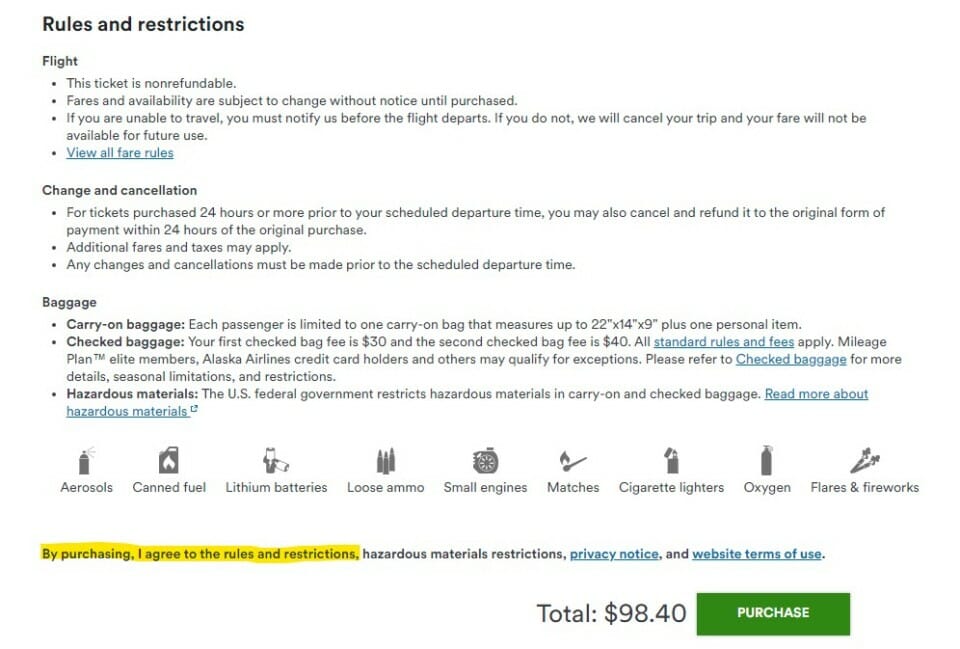
The contract of carriage discloses the airline’s terms and conditions. It is up to you to know what the contract of carriage does and doesn’t do. In the case of checking 30 liters of liquor, this is what the COC for Alaska Airlines (Section H, paragraph 6, subsection d, article 9) states:
Liquor cartons: Alcoholic beverages in retail packaging may be checked as Baggage subject to the following conditions: (a) For alcoholic beverages less than 24 percent alcohol by volume (including most wines and beers) there are no restrictions on the amount that may be accepted in Checked Baggage or purchased after completing security screening at the checkpoint (Duty Free). If traveling internationally, alcoholic beverages may be subject to customs limits in the arrival country; (b) For alcoholic beverages between 24 and 70 percent alcohol by volume, there is a limit of 5 liters (1.3 gallons) per Passenger that may be accepted in Checked Baggage, or that may be purchased after completing security screening at the checkpoint (Duty Free). Packaging must be in receptacles smaller than 5 liters. Alcoholic beverages more than 70 percent alcohol by volume will not be accepted; (c) All alcoholic beverages must be packed to prevent leakage and damage to other Baggage. Alaska shall not be liable for breakage or spillage of alcoholic beverages. Normal Checked Baggage allowance limits, excess charges and Carry-On Baggage limits apply; (d) Up to 3 oz. (100ml) of an alcoholic beverage may be taken through the security checkpoint provided it is less than 70 percent alcohol by volume, in a container that is 3 oz. or smaller, and is carried in a plastic zip-top bag; (e) Alcohol transported on an airplane cannot be consumed on board.
The Southwest passenger stated that nobody told him that he couldn’t check 30 liters of liquor. I’m sure the Southwest contract of carriage told him when he agreed to purchase his tickets. As far as safety is concerned, liquor represents a flammable liquid.
The FAA Is Not Law Enforcement
The FAA is a federal agency with two missions:
- Promoting the aviation industry and
- Ensuring safety in aviation.
The FAA has no law enforcement authority. The fines that have been levied are civil fines. There is no criminal action taken by the FAA which has left that up to local law enforcement. These passengers can dispute the fines or appeal to have them reduced. That sets up the next problem which is enforcing the collection of these fines. The FAA is not in the debt collection busniness so they may have to assign these fines to debt collection companies.
House Transportation Chairman Peter DeFazio told CNN this week that he would like to see punishment that’s even harsher than fines, with those accused of in-flight violence facing prison time.
“If you interfere with a crew member’s duties and put the rest of the plane in jeopardy, or assault the crew member, you’re facing $35,000 in fines for each incident and up to 20 years in prison,” Association of Flight Attendants President Sara Nelson told CNN. “People need to understand there are severe consequences here.”
The FAA would like to get law enforcement help from the FBI. They need an agency that has jurisdiction over criminal matters and can prosecute them.
Final Thoughts
I have been flying since the late 1960’s. Maybe once a year, I would see a passenger that had a little too much to drink. Never did I see a fistfight break out at cruising altitude. This is no doubt that Covid has contributed to the increase in unruly passengers. Three-quarters of the altercations start out with face mask compliance. Unruly passengers present a serious threat to safety to everyone aboard an airliner. A 100-ton, flying can of Pringles is not the place for Saturday nights at the fights. Who would have thought that the training that flight attendants are flocking to is self-defense?
Let’s be clear – failure to comply with an aircrew member’s instructions is a violation of federal law. Assaulting an aircrew member is also a violation. The top priority of an airline flight crew is to keep you safe. If you are unhappy about your flight, contact customer care for your airline and take it up with them. Let’s return back to the days of flying “the friendly skies”.

